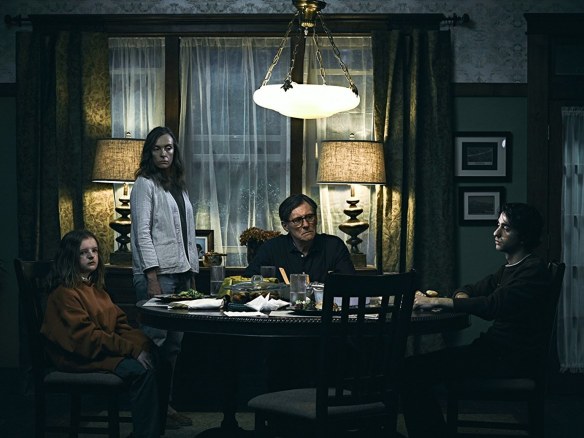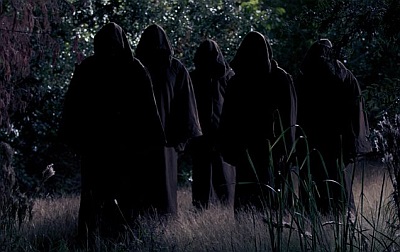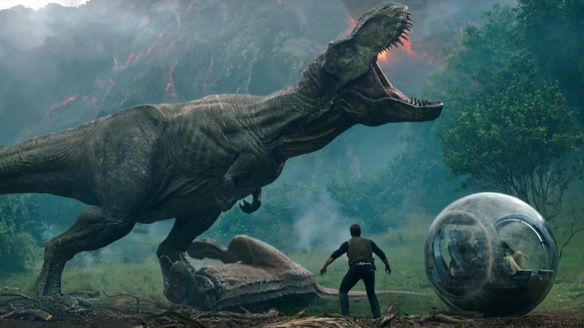
Is Hereditary as terrifying as reviews are making it out to be? No. Quite honestly I can’t see what those lily-livered critics are blithering on about. I mean, yes if you’re unused to the horror genre, then you might find it scary (and the usual warnings apply for violence, gore, disturbing images, swearing, and so on), but this generation’s The Exorcist? Not a chance.
On the plus side, writer/director Ari Aster’s debut is exceptionally well-directed, and features a first-rate central performance from Toni Collette as Annie, a miniature model artist whose mother has just passed away. Annie’s mother was a difficult and secretive woman, and whilst she is much missed by her granddaughter Charlie (Milly Shapiro), Annie has a much harder time grieving for the mother she so often detested. Amid this bereavement, Charlie’s brother Peter (Alex Wolff) finds his already tense relationship with his mother is placed under pressure, whilst Annie’s husband Steve (Gabriel Byrne) ineffectually tries to hold the family together. Annie then finds occult artefacts amongst her late mother’s possessions. Weird things begin to happen, leading to a further shocking tragedy and the ensuing escalation of bad stuff.
From the admittedly superb opening shot – a masterful composition zooming into a model house which then seamlessly transitions into a scene where a character walks into a bedroom – Aster conjures a thick atmosphere of impending dread. Other neat techniques designed to heighten said dread, such a sudden exterior cuts to night or day, reveal shocking details in a clever way. He makes good use of dark spaces where things may or may not lurk in the shadows, and the oozing menace is enhanced by Colin Stetson’s unsettling music score and superb sound work. Performances are all spot-on, particularly from Toni Collette who I have always greatly admired. Milly Shapiro is quite a find too, and let’s just say you’ll never react to tongue-clicking in quite the same way again.
Yet despite all these good points, the film has undoubtedly been overpraised. I am still trying to work out quite why it didn’t scare me the way it has scared so many audiences. As a big horror fan, I went into it desperately wanting to love it, desperately wanting it to deliver that out-of-body-experience terror that I recently got from the likes of The Babadook and Under the Shadow. But in the end, I was disappointed on that score.
I think the main problem lies with the screenplay. It tells a coherent story, yet it feels as though it doesn’t know quite what it wants to be. It starts off very much in psychological horror territory, dealing with grief issues in provocative and potentially interesting ways (the idea that Annie feels guilty for not being adequately sad about the death her ghastly mother, for instance). However, it then ventures into Satanic panic territory, ultimately coming off as a half-baked cross between The Wicker Man and Rosemary’s Baby with a dash of Don’t Look Now. I suppose it is still its own beast, yet the shift in focus from the earlier psychological elements feels oddly unsatisfying, meaning I cared less about the characters as the film progressed, which is never a good thing.
The other problem I have with this story is I kept asking, where is God? I don’t mean that the film has an anti-Christian worldview (arguable, but beside the point here). What I mean is that the presence of good in a horror tale makes the bad more frightening, because it provides appropriate contrast. The reason The Exorcist is so compelling is because that film is a gripping battle between good and evil, with deeply flawed characters whose ailing faith is put to the ultimate test.
Hereditary belongs to the journey-into-irreversible-darkness horror tradition, but still has very little in the way of contrast, which for me is an issue. In tales of this sort, where protagonists foolishly venture ever deeper into evil through getting involved in occult activity or probing questions best left unanswered, said protagonists are given opportunities, often delivered as warnings by priests or the like, to turn aside from their destructive path. However in Hereditary, the film seems to reference certain tales of Sophocles, whereby humans are helpless pawns of pagan gods and have no clear choice one way or the other. Again, if the fate of Annie and her family is inevitable, it becomes harder to actually care about what happens to them in the finale. By contrast, something like The Wicker Man or The Vanishing are far more compelling films, because again and again the protagonists are given chances to avoid their grisly fate.
Ultimately, Hereditary is an interesting, well-directed horror film with some fine performances, and certainly an arresting debut. However, for the reasons outlined above, I didn’t find it terrifying or entirely satisfying.



 As someone who writes horror stories, I often ask the question, what do people find scary? Of course, scariness is very much in the eye of the beholder. For some, the prospect of being stalked by a serial killer is terrifying. For others, the supernatural frightens. Others still shudder at demonic possession, sinister cults, witchcraft, axe-murderers, clowns, spiders, cold callers, people using mobile phones in cinemas, political opinions on Facebook… The latter three I find particularly alarming.
As someone who writes horror stories, I often ask the question, what do people find scary? Of course, scariness is very much in the eye of the beholder. For some, the prospect of being stalked by a serial killer is terrifying. For others, the supernatural frightens. Others still shudder at demonic possession, sinister cults, witchcraft, axe-murderers, clowns, spiders, cold callers, people using mobile phones in cinemas, political opinions on Facebook… The latter three I find particularly alarming. I am not above writing variations on any of the above tropes. If done well, they can be very effective. However, what most gets under my skin is psychological horror and existential horror. The idea of going insane I find truly bone-chilling, whether as a result of grief, guilt, obsession, addiction, post-traumatic stress, mind altering drugs or any other factor. Equally unsettling is the nightmarish, Lynchian idea that you might become another person.
I am not above writing variations on any of the above tropes. If done well, they can be very effective. However, what most gets under my skin is psychological horror and existential horror. The idea of going insane I find truly bone-chilling, whether as a result of grief, guilt, obsession, addiction, post-traumatic stress, mind altering drugs or any other factor. Equally unsettling is the nightmarish, Lynchian idea that you might become another person.







